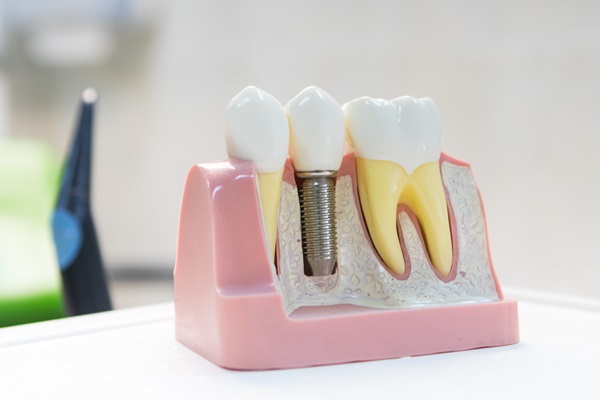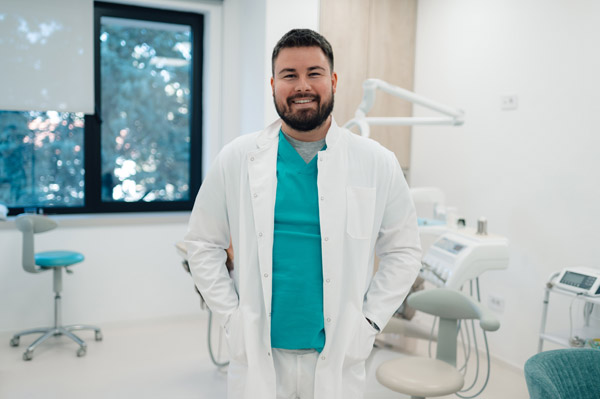Adjusting to New Dentures: When You Should Replace Your Old Dentures

Adjusting to new dentures is a familiar feeling to the 36 million Americans that have no teeth, according to the American Dental Association (ADA). Dentures allow those Americans to eat and speak normally when they have lost their natural teeth to age, gum disease, or dental trauma. Unfortunately, even the best dentures are expected to last only 7-10 years. If you are unsure whether it is time to replace your dentures, keep these signs in mind.
Changes in fit
Commonly, dentures stay in place through implants, a close fit to the gums and jaw bone or, for partials, a clasp that fits onto a natural tooth. All of these are custom-made to match your mouth's anatomical structure. However, when teeth are missing, this structure is not always constant. Other teeth settle into a new position, gums shift or recede, and jawbones shrink as they are resorbed. Consistently wearing your dentures helps fix teeth and gums in place, and exercising your jaw can prevent bone resorption. However, some changes are still to be expected over the years. Left unaddressed, loose dentures not only cause discomfort and difficulty in talking and eating; they may also irritate gum tissue or trap food and plaque, leading to sores and lesions that further worsen the issue.
Often, it is apparent when dentures are loose because they shift or even fall out. You can also tell that you may have a fit issue if they make a clicking sound when you eat or speak, or if you have a hard time speaking clearly. Your dentist may also detect changes in your mouth's structure during regular visits by taking impressions and comparing them to previous ones.
Relining dentures
For relatively new dentures, a complete replacement may not be necessary if they stop fitting properly. Instead, if the changes are minor, a dentist can reline your dentures in the office. The process consists of adding or replacing the base material where it comes into contact with the gums. Relining saves you the cost of full replacement and the period of adjusting to new dentures. You can talk to your dentist about this option during your regular visits.
Damage and wear
Taking good care of your dentures extends their lifespan and keeps them fitting properly. Still, accidents can occur and regular use does wear on the materials. Besides teeth chipping or breaking off, signs of damage to your dentures include:
- Deterioration of materials
- Stained or discolored teeth, typically caused by the formation of cracks
- Visibly bent or warped base
- Irritated gums or tongue
- Pain and discomfort while chewing or speaking
- Unexplained pain or discomfort in the jaw or neck
Attempting to fix damaged dentures on your own is not recommended, especially fixing the base, as this is likely to worsen the issue.
Damage can be mitigated through proper care: regular brushing and cleaning with cold water and approved cleaning solutions. Do not use abrasive materials or products containing bleach or peroxide. Also, avoid chewing or biting down on very hard foods.
Conclusion
While adjusting to new dentures is rarely enjoyable, your old ones eventually need to be replaced. Be aware of signs of damage or changes in fit to know when it is time to invest in a new set.
Request an appointment here: https://www.kevinjdailydds.com or call Kevin J Daily DDS at (831) 580-1141 for an appointment in our Santa Cruz office.
Check out what others are saying about our dental services on Yelp: Adjusting to New Dentures in Santa Cruz, CA.
Recent Posts
Most of us know that dentures are an option if we lose our teeth, but there is also a more permanent solution called implant supported dentures. If you’re not familiar with this type of denture, that’s ok. Recent advancements in dental technology have led to where patients can receive implants combined with other dental applications…
Considering implant supported dentures? This popular treatment option combines two solutions that both work to replace missing teeth. While implant-supported dentures alone solve the problem of missing teeth, they also benefit oral health in ways that may not be so obvious. Continue reading to learn more about these benefits. Outlined below are a few ways that…
Wondering if implant supported dentures will fit in with your lifestyle? When you find out that you need to get dentures so your mouth can function properly, you need to make a choice that works for you. There are a few different denture choices available, making it a good idea to understand more about each…
Wondering if implant-supported dentures are the right tooth replacement option for you? When you are missing multiple or even all your teeth, you need to find an option that allows you to once again have a full set of teeth. Your mouth was designed to function with a full set of teeth. That means when…


